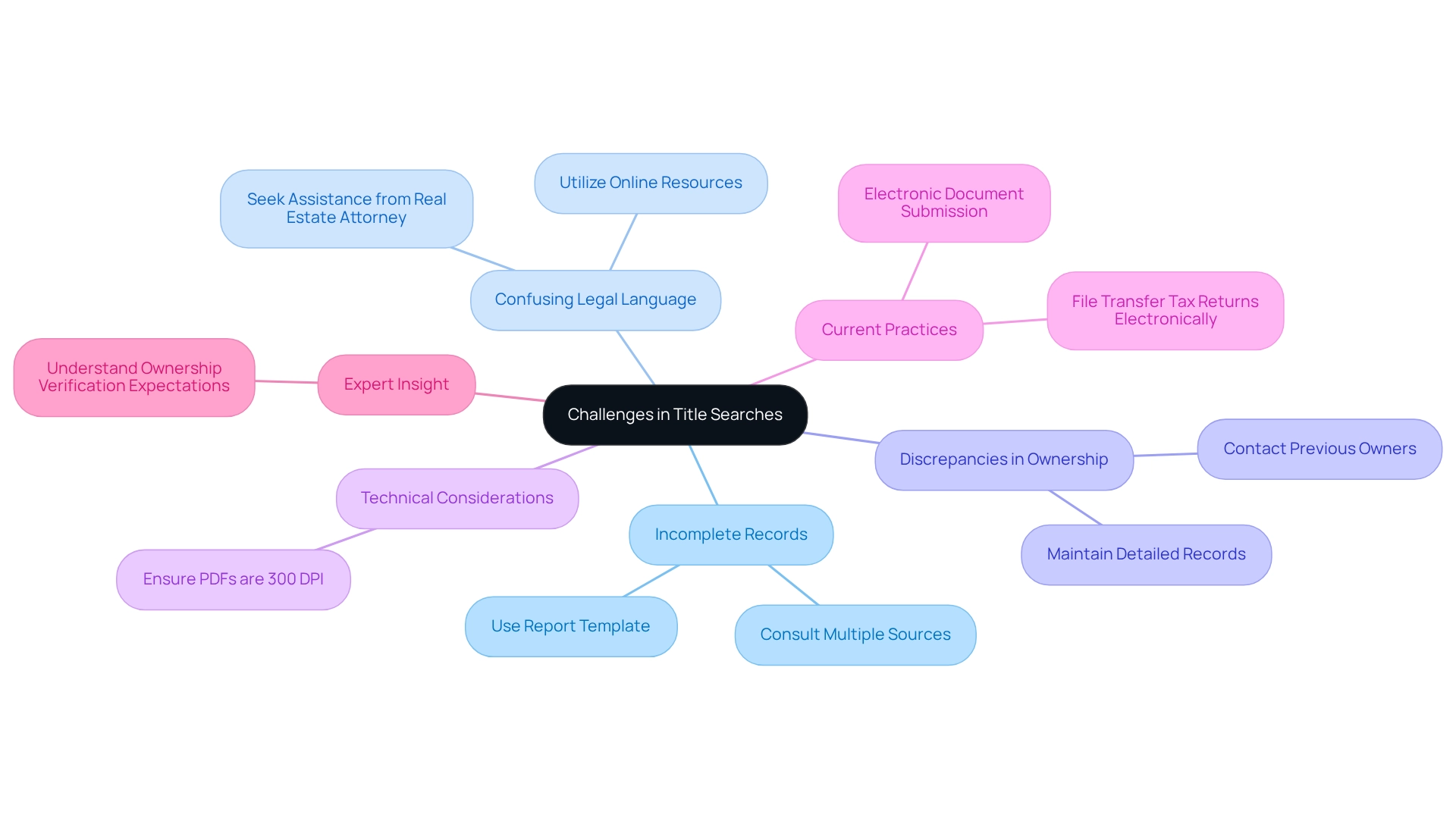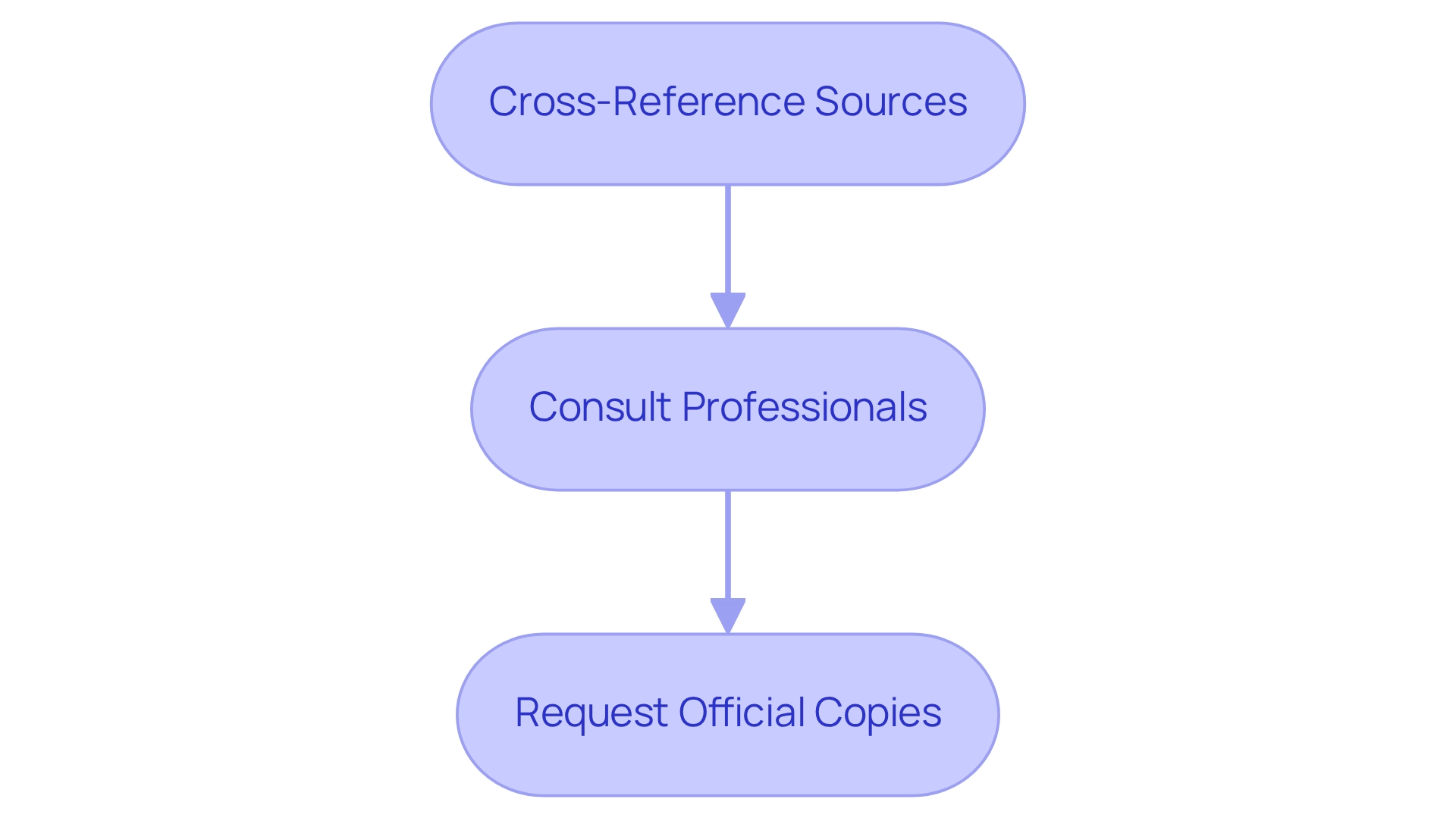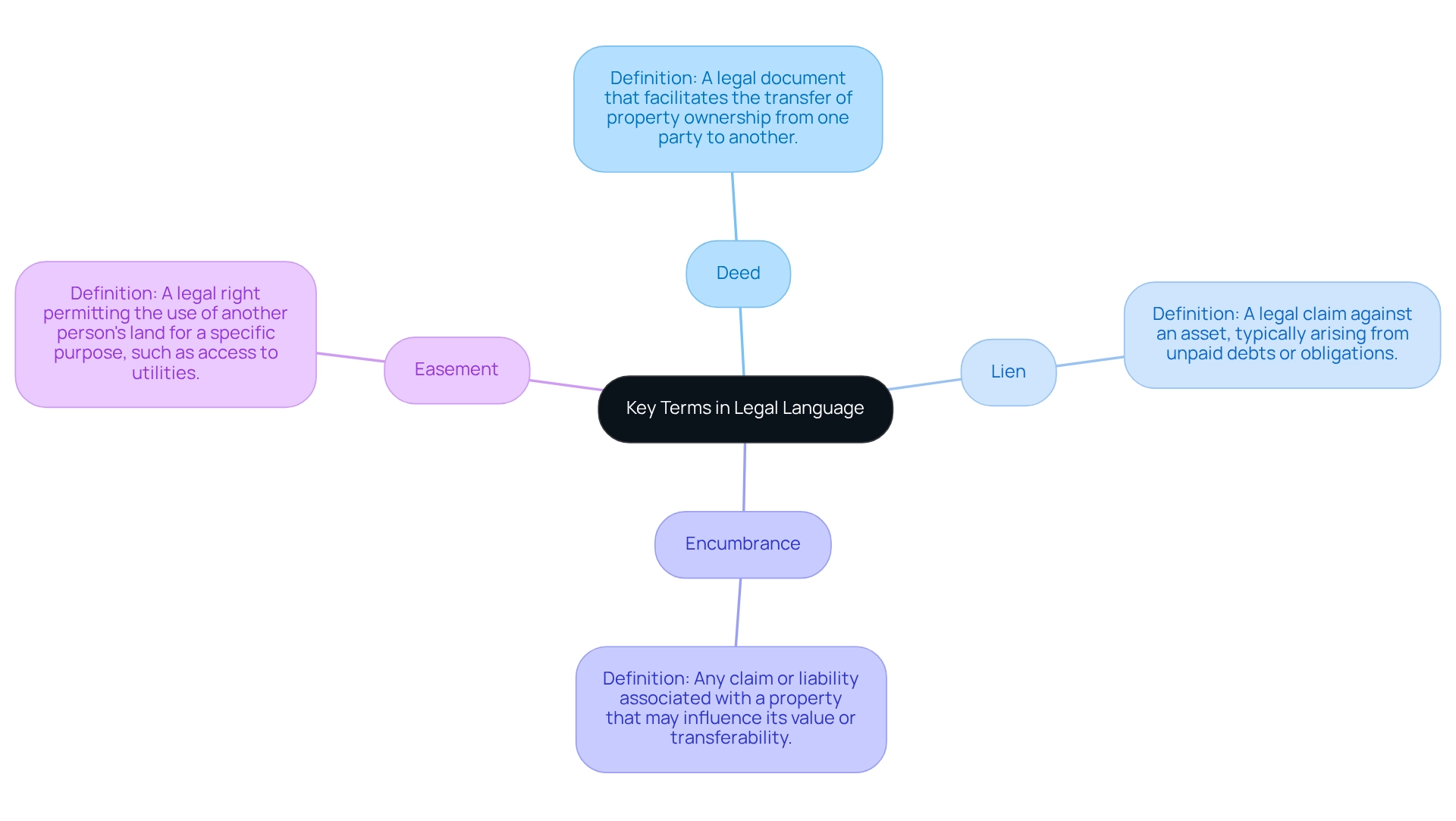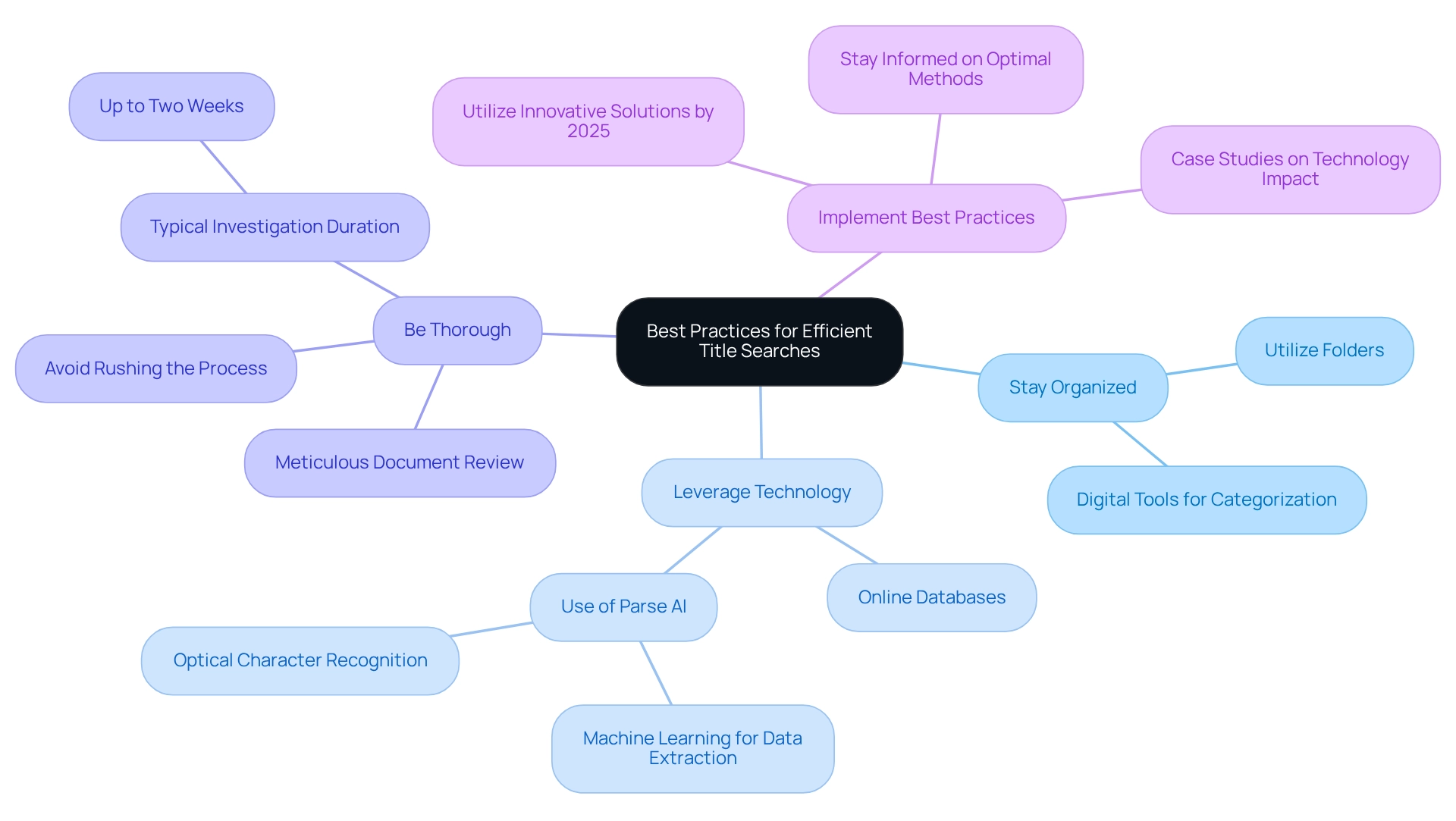Overview
Conducting a property title search for free is essential for safeguarding your investments. To start, gather relevant information about the property and access public documentation. Review the chain of ownership and check for any liens that may affect the title. It is crucial to document your findings thoroughly. This article outlines these steps and emphasizes the importance of utilizing free online resources and technology. By enhancing the efficiency of the title search process, you can ensure smoother real estate transactions and protect your financial interests.
Introduction
In the intricate world of real estate, understanding property title searches is paramount for anyone involved in buying, selling, or financing a property. This vital process not only confirms legal ownership but also reveals any claims or liens that could hinder a transaction. Furthermore, as technology advances, tools like Parse AI are revolutionizing how these searches are conducted, making them faster and more efficient. In 2025, the significance of conducting thorough title searches remains undiminished, as they safeguard investments and facilitate smoother transactions. This article explores the essentials of property title searches, the reasons behind their necessity, and the innovative resources available to streamline the process.
Understanding Property Title Searches: An Overview
An ownership document investigation is a crucial procedure that involves reviewing public documents to ascertain the legal possession of an asset and to identify any claims or liens that may exist against it. This thorough examination typically encompasses a review of various documents, including deeds, mortgages, and tax records. Understanding the chain of ownership is particularly vital, as it delineates the history of possession and ensures that the property can be legally sold free of encumbrances.
In 2025, ownership investigations are indispensable for buyers, sellers, and lenders alike, as they confirm that the seller possesses the authority to transfer ownership and that no unresolved issues could jeopardize the transaction. Recent data indicates that leveraging advanced technologies, such as those offered by Parse AI, can significantly expedite the search process, facilitating faster and more accurate verification of legal ownership. For instance, the case study titled 'Parse AI: Revolutionizing Research on Titles' demonstrates how the platform empowers researchers to complete abstracts and reports more efficiently, resulting in substantial cost savings compared to traditional methods.
Furthermore, Parse AI's commitment to continuous improvement through collaboration with land service experts addresses the pressing challenges in property research, underscoring the necessity of comprehensive investigation in real estate transactions.
Why Conduct a Property Title Search?
Performing a property title search for free is essential for several compelling reasons. Primarily, it confirms the legal ownership of the asset, ensuring that the seller possesses the authority to sell. Additionally, it uncovers any liens, mortgages, or other claims against the property that could jeopardize ownership rights.
The financial repercussions of neglecting a property examination can be severe; studies indicate that a significant portion of real estate transactions encounter ownership issues, leading to potential financial setbacks that can reach thousands. For instance, Sarah Shapero's efforts have saved numerous homes from foreclosure, underscoring the crucial importance of thorough ownership research.
Furthermore, the absence of proper documentation review can result in costly legal disputes. Real estate attorneys emphasize that verifying ownership is vital for prospective buyers, as Laura M. Kaplan, Senior Counsel, asserts, "Conducting a property inquiry is vital for potential buyers, regardless of whether you choose to acquire ownership insurance." Failing to confirm ownership can lead to complications during the closing process.
By identifying potential issues early, buyers can negotiate necessary repairs or price adjustments, or even choose to withdraw from a deal if significant problems emerge. As we approach 2025, the reasons for conducting property ownership investigations remain as pertinent as ever, with the financial risks associated with oversight being a primary concern for buyers and investors alike. The proactive approach of executing a free property title search not only safeguards investments but also facilitates a smoother transaction process.
Moreover, platforms like Parse AI are revolutionizing research by leveraging machine learning and optical character recognition to streamline the process, providing substantial cost savings compared to traditional methods. This innovation is particularly relevant in light of ongoing discussions about the scalability of ownership systems, such as those in Iowa, which highlight the necessity for efficient and reliable research solutions.
Free Resources for Property Title Searches
Numerous free resources exist for conducting property title searches, significantly enhancing accessibility for real estate professionals. Many counties maintain online databases that allow users to access vital real estate documents, including deeds and tax evaluations. Websites such as the county clerk's office and local assessor's office typically feature searchable databases that streamline the research process.
Furthermore, platforms like NETR Online and FamilySearch provide access to public documents across various states, facilitating the collection of information at no cost. For those who prefer a more traditional approach, visiting the county recorder's office can also yield valuable insights without any fees. It is advisable to have the location address or parcel number ready to facilitate a more efficient search.
As of 2025, over 60% of counties have embraced digital transformation by offering online asset databases. This shift not only enhances accessibility but also reflects a growing trend toward utilizing technology in public information management. Specialists recommend leveraging these complimentary resources to conduct property title searches for free, thereby enhancing efficiency and reducing expenses related to real estate document inquiries.
County clerks have observed that the increased availability of online records has significantly improved public access to vital information. One clerk remarked, "The ease of access to online records has transformed how we serve the public, making vital information readily available to everyone."
Moreover, consumer insights indicate that over 2,500,000 interviews across various sectors highlight the importance of utilizing free resources in real estate inquiries. This underscores the relevance of these tools in the real estate industry, particularly as trends indicate an increasing reliance on online resources—similar to the rise in mobile traffic observed in retail sectors, where mobile visits accounted for approximately 61 percent of site traffic in February 2025.
Step-by-Step Guide to Conducting a Title Search
To effectively perform a title search, follow these detailed steps:
- Gather Information: Begin by collecting comprehensive details about the asset. This includes the address, the current owner's name, and the parcel number. The more information you have, the easier it will be to locate the relevant records.
- Access Public Documentation: Go to your county's real estate files website or visit the local assessor's office. Utilize the information you gathered to start your property title search for free. Public records are crucial, as they contain historical data that can reveal important insights about the property.
- Review the Chain of Ownership: Examine the chain of ownership, which outlines the history of possession. This step is essential, as it aids in recognizing former owners and any claims related to the asset. Understanding the chain of title can also uncover old boundary and survey restrictions that may have been imposed by prior homeowners, potentially affecting your ownership rights.
- Check for Liens and Encumbrances: Investigate any outstanding liens, mortgages, or legal claims that may impact the property. This information is typically available in public records and is essential to ensure that there are no unresolved issues that could complicate the transaction. Discrepancies in the document, such as unresolved liens or conflicting ownership claims, must be addressed before a mortgage lender can approve a loan.
- Document Your Findings: Keep thorough records of your discoveries, including any discrepancies or problems faced during your investigation. This documentation is invaluable for future reference or negotiations. For example, a case study emphasized how Rudman Winchell helped a client save hundreds of thousands of dollars by avoiding a significant error through comprehensive documentation and research.
By adhering to these steps, you can conduct a property title search for free, enabling you to perform a detailed examination of the real estate records and ensuring that you are well-informed about the asset's history and any potential issues that may develop. Remember, closing is the last step in a real estate deal where ownership officially transfers, making your ownership investigation a crucial part of the process.
Common Challenges in Title Searches and How to Overcome Them
Conducting a title search presents several challenges that require careful navigation.
- Incomplete Records: A prevalent issue in title searches is the existence of missing or incomplete property records. Statistics reveal that a significant percentage of document searches encounter such gaps, hindering the research process. To effectively address this, it is advisable to consult multiple sources, including online databases, county office archives, and local historical societies, to gather comprehensive information. Employing a report template that organizes heading information into schedules can simplify the process and ensure that all pertinent data is included.
- Confusing Legal Language: The legal terminology found in real estate documents can often be perplexing. To mitigate misunderstandings, it is prudent to seek assistance from a real estate attorney who can provide clarity. Furthermore, numerous online resources are available that break down complex legal jargon into more digestible explanations, facilitating a better understanding of the documents involved.
- Discrepancies in Ownership: Conflicting information regarding real estate ownership may arise during a title search. In such cases, it may be necessary to reach out to previous owners or the county clerk's office for clarification. Maintaining detailed records of all communications is crucial, as it helps preserve a clear trail of information and can prove invaluable if disputes arise later.
- Case Study Insight: For instance, the Pre-foreclosureReport serves as a vital tool for real estate professionals involved in foreclosure transactions. It offers initial insights that assist in navigating the complexities of ownership discrepancies, ensuring informed decision-making during critical stages of real estate transactions. This report supports pre-foreclosure transactions for parties involved, including trustees and law firms, and provides essential insights that facilitate informed decision-making.
- Technical Considerations: When handling real estate documents, it is important to note that PDFs must have a resolution of 300 DPI for proper conversion to images. This technical requirement can significantly affect the quality of the documents utilized in ownership investigations.
- Current Practices: Additionally, it is essential to recognize that the City Register now accepts all documents electronically, and all real property transfer tax returns must be filed electronically using ACRIS. This transition to digital documentation can streamline the ownership inquiry process and enhance efficiency.
- Expert Insight: As Jane F. Bolin observes in "What to Anticipate in a Report on Ownership in Florida," comprehending the expectations and subtleties of ownership verification documents is vital for efficient maneuvering through the process.
By proactively addressing these challenges, researchers can enhance their efficiency and accuracy, ultimately leading to more successful outcomes in property ownership searches.

Verifying the Accuracy of Title Information
To verify the accuracy of title information, it is essential to adhere to the following guidelines:
- Cross-Reference Sources: Always cross-check information from multiple sources, including county records, online databases, and legal documents. This practice confirms the validity of the data.
- Consult Professionals: Should you encounter discrepancies or complex legal terminology, consider seeking guidance from a real estate attorney or a conveyancing company for expert advice.
- Request Official Copies: Obtain official copies of documents, such as deeds and tax records, to ensure access to the most accurate and up-to-date information.

Decoding Legal Language in Title Documents
Legal documents concerning real estate titles frequently encompass intricate terminology that is essential for understanding property ownership. Familiarity with these terms is crucial for effective navigation of such documents. Here are several key terms defined:
- Deed: A legal document that facilitates the transfer of property ownership from one party to another.
- Lien: A legal claim against an asset, typically arising from unpaid debts or obligations.
- Encumbrance: Any claim or liability associated with a property that may influence its value or transferability.
- Easement: A legal right permitting the use of another person's land for a specific purpose, such as access to utilities.
Acquiring knowledge of these terms will significantly enhance your ability to navigate legal documents with confidence.

Best Practices for Efficient Title Searches
To perform efficient title inquiries, it is essential to adopt the following best practices:
- Stay Organized: An organized system for your documents and notes is crucial to avoid confusion during your inquiry. Utilize folders or digital tools to categorize and easily access information, significantly enhancing your workflow.
- Leverage Technology: Embrace online databases and digital tools to simplify your retrieval process. Many counties now offer digital access to land records, which can substantially decrease the time spent on searches. For instance, Parse AI employs machine learning and optical character recognition to extract essential information from title documents, enabling title researchers to complete abstracts and reports more quickly and accurately. This innovative approach addresses the challenges associated with the time and capital required for confirming property ownership.
- Be Thorough: Rushing through the process is counterproductive. Take the necessary time to meticulously review all relevant documents and records. A thorough investigation not only guarantees that you gather all essential information but also helps avoid potential legal problems arising from insufficient inquiries. Statistics indicate that a property investigation can generally require up to two weeks, depending on the property's background and complexity, underscoring the significance of meticulousness.
- Implement Best Practices: Stay informed about optimal methods for efficient property investigations, especially as technology advances. By 2025, utilizing innovative solutions can result in substantial cost reductions and enhanced precision in research, as evidenced by successful case studies in the industry. Real estate professionals increasingly recognize the value of technology in streamlining property title searches, leading to more efficient operations and improved outcomes.

Conclusion
Conducting a property title search is an essential step in the real estate transaction process, ensuring that buyers, sellers, and lenders are protected from potential legal issues. This article has highlighted the critical components of title searches, including:
- Verifying legal ownership
- Identifying liens
- Understanding the chain of title
Furthermore, the integration of advanced technologies, such as Parse AI, has transformed the way these searches are conducted, making them faster and more efficient, thereby reinforcing the importance of thorough research in safeguarding investments.
The necessity of property title searches cannot be overstated, as they play a pivotal role in preventing costly legal disputes and financial losses. By utilizing free resources and following a structured approach, individuals can navigate the complexities of title searches effectively. Moreover, overcoming common challenges—such as incomplete records and confusing legal language—can further enhance the accuracy and reliability of title information.
As the real estate landscape continues to evolve, the adoption of innovative tools and best practices will remain crucial. By staying informed and leveraging technology, real estate professionals can ensure smoother transactions and protect their clients' interests. Consequently, prioritizing property title searches in 2025 and beyond will lead to more secure and successful real estate experiences for all parties involved.
Frequently Asked Questions
What is an ownership document investigation?
An ownership document investigation is a procedure that reviews public documents to determine the legal possession of an asset and to identify any claims or liens against it. This includes examining deeds, mortgages, and tax records.
Why is understanding the chain of ownership important?
Understanding the chain of ownership is vital as it outlines the history of possession and ensures that the property can be legally sold free of encumbrances.
Who benefits from ownership investigations in 2025?
Ownership investigations are essential for buyers, sellers, and lenders, as they confirm that the seller has the authority to transfer ownership and that there are no unresolved issues that could jeopardize the transaction.
How can advanced technologies assist in ownership investigations?
Advanced technologies, such as those offered by Parse AI, can expedite the search process, allowing for faster and more accurate verification of legal ownership.
What are the financial implications of neglecting a property title search?
Neglecting a property title search can lead to severe financial repercussions, including potential setbacks in real estate transactions that can cost thousands of dollars.
What can happen if ownership is not verified before a real estate transaction?
Failing to verify ownership can lead to costly legal disputes and complications during the closing process, which can affect buyers' ability to finalize the transaction.
How can early identification of issues during a property title search help buyers?
Early identification of issues allows buyers to negotiate necessary repairs or price adjustments or even withdraw from the deal if significant problems arise.
What role does Parse AI play in property title searches?
Parse AI leverages machine learning and optical character recognition to streamline the property title search process, providing substantial cost savings compared to traditional methods.
Why is conducting a property title search considered a proactive approach?
Conducting a property title search is proactive because it safeguards investments and facilitates a smoother transaction process by identifying potential issues early on.




